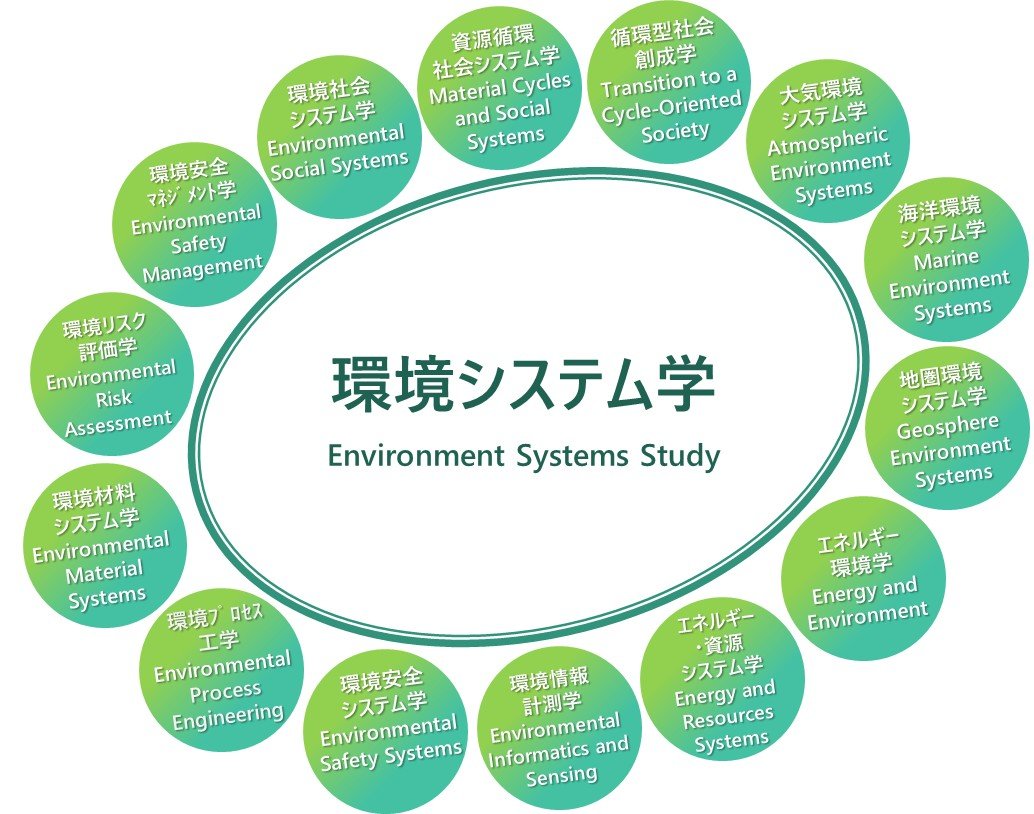About
Greetings
Greetings from Head of Department

Currently, we are facing various environmental problems, such as energy, resources, and safety. To solve these problems and build a sustainable society, it is important to view the environment as a system and understand it comprehensively from a broad perspective. The Department of Environment Systems, under the slogan "Learn about the environment today, open up the future of the environment," conducts research and education to properly grasp environmental problems that have emerged, explore and propose solutions based on that, prevent problems before they occur, and design a sustainable society based on environmental harmony.
In our department, active exchanges are carried out across the levels of positions, without barriers between laboratories, such as the department seminar, joint seminars between laboratories with different research fields, and joint research. These research exchanges are a place to take the first step toward transdisciplinary and are an excellent environment for cultivating human resources with a wide interdisciplinary perspective.
We have prepared a practical educational curriculum consisting of basic subjects, applied subjects, and field training subjects, with the goal of cultivating human resources who can raise their own problems and take the initiative in solving them through systems theory and logical thinking, and sending them out into the world.
I am looking forward to conducting research at the Kashiwa campus with young students brimming with a frontier spirit who are paving new paths towards building a sustainable social system through environmental systems studies.
Head of Department
Kenichi TONOKURA
About Us
Department of Environment Systems
The production of artificial materials, the discharge of wastes, and the development of Earth's surface, underground and ocean have significantly affected the environment systems which are composed both by natural environments and human societies, and have degraded the wealth of ecosystems and the quality of human life. To tackle and overcome these problems, it is quite important to understand the material and energy cycles, and to clarify the interaction among sub-systems which constitute the whole environment system. In addition, it is highly expected to develop problem-solving methodologies and their application through the detailed study by natural scientific and engineering approach together with the integration of economics, policy science, and international cooperation. The viewpoints of risks and safety are also fundamental importance for our activities.
Department of Environment Systems conduct researches and education to design and realize the sustainable societies by analyzing the interaction and relationship between human societies and natural environment, developing the model to represent the environment systems based on the detailed analyses, clarifying the causes of the problems using the systems model, and investigating the possible solutions and the way to manage the system. We expect highly motivated students and researchers to join in our group to collaborate to achieve the objectives.
Research fields of Environment Systems
In the natural world, materials and energy are exchanged among the atmosphere, hydrosphere, geosphere, and biosphere. Human society extracts materials and energy from the natural world and creates various artificial objects. This activity has an impact on the natural world through the discharge of waste and excessive development. To solve environmental problems, the study of environment systems attempts to understand the flow of such materials and energy, and comprehensively deals with the ideal state of social systems from various aspects, such as technology, economy, system, law, education, ethics, risk, and safety.

Modeling of Environment Systems and design of sustainable societies
To study environment systems, we build an environment system model that consists of human society and natural subsystems. To understand the interrelationship between the human world and the natural world, we introduce technologies and policies to the environmental system model and analyze the response of the system. Our ultimate objective is to design a sustainable environment-friendly society by combining approaches such as control and adaption.

Organization
Fields of Environment Systems
The complex challenges we currently face must be analyzed from multiple perspectives. The traditional approach of considering a problem in an individual discipline is insufficient. Therefore, the Department of Environment Systems is involved in various research fields. We have established a system that enables strategic and flexible analysis and discussion from a bird's-eye view to solve environmental problems and realize a sustainable society in collaboration with faculty members from various specialized fields.

Network
We are conducting research in collaboration with various organizations in Japan and overseas.
In Japan
The National Institute for Environmental Studies(Cooperation program:Transition to a Cycle-Oriented Society)
An agreement was signed on October 14, 2005, between the Graduate School of Frontier Sciences, the University of Tokyo, and the National Institute for Environmental Studies to cooperate with each other to further enhance educational and research activities in the master's and doctoral programs of the University of Tokyo, as well as research at the National Institute for Environmental Studies. This is expected to contribute to the development of environmental studies in Japan by promoting their achievements and disseminating their results. The National Institute for Environmental Studies has outstanding achievements and potential for research in the field of a sound material-cycle society. It also has prominent researchers. The cooperation program aims to promote the development of research and education on the transition to a cycle-oriented society.
Overseas
Imperial College London (Exchange Agreement)

An exchange program has been established between the Department of Environment Systems and the Department of Ocean Technology, Policy, and Environment and the Department of Chemical Engineering at Imperial College London, one of the UK's leading science colleges. Since 2009, we have sent and accepted several master's students every year. Students are expected to learn about general environmental problems and their expected impact, and the currently considered countermeasure technologies and their effects. Through lectures and exercises in each country, the program aims to develop future engineers and technology policy-makers who will be responsible for international negotiations on environmental issues.
